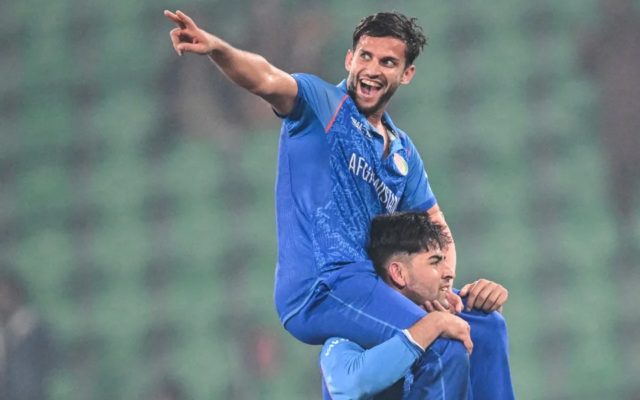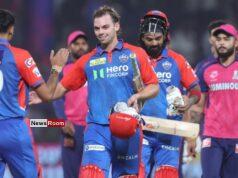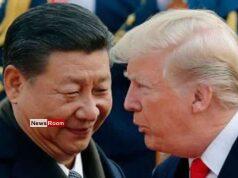Much like Afghanistan’s match against England, the political spectre over this clash is hard to put aside. Matches are rare between the countries with Australia – like England – taking a human rights stance and pledging to suspend bilateral ties while the Taliban remain in power.
Cricket Australia publicly demonstrated its commitment to the cause last month by hosting a T20 match featuring an Afghanistan women’s XI in Melbourne, bringing the issue firmly back into the spotlight.
But underlining the complexities of the issue, Australia do play Afghanistan at ICC events – which has led to some criticism – and this intriguing, budding rivalry will resume in Lahore with much at stake.
Given the tournament’s sharp format, it’s basically sudden death, a virtual quarter-final, after Afghanistan once again knocked out England from an ICC event.
But Afghanistan will be eliminated with a loss, while Australia also must win, with a defeat meaning they will have to rely on South Africa being absolutely pummelled by a beleaguered England with nothing to play for. A washout will see Australia through to the semi-final.
Australia and Afghanistan once again find themselves pitted in a high-stakes contest at an ICC event. At the 2022 T20 World Cup, Australia emerged with a slim six run victory in Adelaide that was ultimately not the net-run-rate boost needed as they crashed out early on home soil.
Glenn Maxwell, of course, changed the course of the 2023 World Cup with a remarkable double century that still beggars belief. But Afghanistan had some measure of revenge at last year’s T20 World Cup as they overcame a brief Maxwell onslaught with a 21 run victory that memorably sealed their place in the semi-finals.
And, once again, a semi-final spot is up for grabs. The form line is a little hard to read with both teams having tight wins over a wheezing England. Afghanistan bounced back strongly after a disastrous opening against South Africa while Australia’s momentum came to a halt after their clash against the Proteas was washed out.
Even though they are considerably weakened – against England they fielded their least experienced attack at an ICC ODI event since 1983 – Australia mustered up their big-game pedigree under pressure to make a statement. Their batting line-up still contains plenty of firepower with centurion Josh Inglis emerging as a genuine star batter across formats. It is little wonder that some believe he’s Australia’s next captain.
A back against the wall triumph is in play, but Australia will have to firstly get past rising Afghanistan in a game that feels evenly poised. Afghanistan will lean on their spin-heavy attack, but Australia do have numerous players adept against the turning ball – led by Inglis.
Australia’s depleted pace stocks makes that department more equally matched than previous encounters, while an in-form Ibrahim Zadran – coming off a Champions Trophy-best score of 177 – ensures he can go toe-to-toe with his counterparts.
The prospect of more bad weather in Lahore could also play a factor in a clash that is set to be just as compelling as the recent matches between these teams.
There isn’t much cricket history between the countries, but Glenn Maxwell is probably the first name that springs to mind with this match-up. In the last ODI between the teams, a hobbled Maxwell produced one of the greatest ever innings to rescue Australia from the brink at the 2023 World Cup and crush the hearts of Afghanistan. Maxwell enters this match in great form having put the finishing touches against England after a brilliant end to the BBL season. It will be interesting to see if his presence at the crease spooks Afghanistan, who are adamant they haven’t devoted too much of their plans on him.
While Afghanistan’s slew of quality spinners deservedly attracts plenty of attention, seam bowling allrounder Azmatullah Omarzai stole the show against England with his maiden five-wicket haul of his professional career. He was particularly superb at the death with three wickets when the game was on a knife’s edge. Omarzai’s emergence has helped Afghanistan better balance their attack and they are no longer merely reliant on their spinners for success. He’ll need to back up that performance against a formidable Australia batting-order and his canny, skiddy bowling will need to be on point against big-hitting openers Travis Head and Matthew Short. If he can strike early breakthroughs then Afghanistan will be right in the hunt.
Due to the inclement conditions, team lists weren’t even announced for the Australia-South Africa clash. It makes predicting Australia’s line-up somewhat difficult. The team is mostly settled, but they might be tempted to tweak their bowling attack that leaked 351 runs against England. Left-arm quick Spencer Johnson might be in the selection gun after he was overlooked for the death overs against England. But his pace and bounce could be a weapon against Afghanistan’s top order. Australia, who trained indoors on match eve, will also consider bowling allrounder Sean Abbott, who offers a point of difference and strengthens the batting, and legspinner Tanveer Sangha given Marnus Labuschagne’s part-time legspin played a role against England.
After such a momentous victory, Afghanistan are likely to go unchanged for the third straight game and back their spin strength in subcontinental conditions. The trio of Rashid Khan, Mohammad Nabi and Noor Ahmad will present considerable challenges for the Australians.
Australia (possible): Matthew Short, Travis Head, Steven Smith (capt), Marnus Labuschagne, Josh Inglis (wk), Alex Carey, Glenn Maxwell, Sean Abbott/Spencer Johnson, Ben Dwarshuis, Nathan Ellis, Adam Zampa
Afghanistan (possible): Ibrahim Zadran, Rahmanullah Gurbaz (wk), Sediqullah Atal, Rahmat Shah, Hashmatullah Shahidi (capt), Azmatullah Omarzai, Mohammad Nabi, Gulbadin Naib, Rashid Khan, Noor Ahmad, Fazalhaq Farooqi
[Cricinfo]








